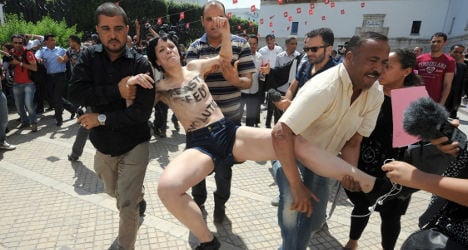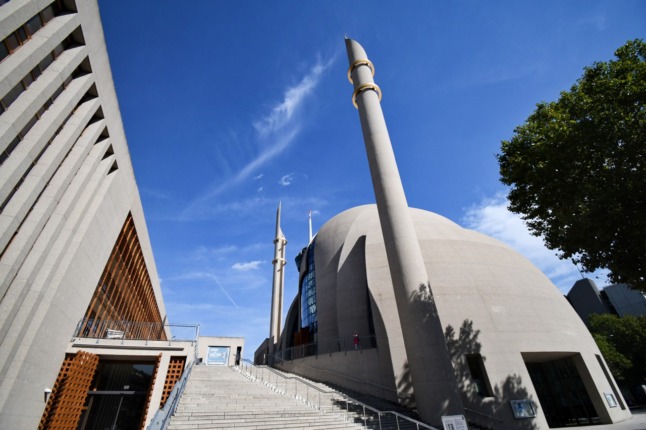Standing on a wall in front of the railings outside the courthouse, the women, two French and the other German, shouted: "Free Amina", in support of a young Tunisian woman detained while protesting against hardline Islamists and awaiting trial on Thursday.
"Breasts Feed Revolution" read graffiti on the women, who wore only denim micro shorts and black shoes, and "Femen Extremist" was daubed on their backs.
The police swiftly arrested them and took them inside the building, before a crowd of journalists.
The Femen protest, also intended to highlight the difficulties facing women in socially conservative Tunisia, provoked the anger of onlookers, some of whom tried to cover up the women.
A group of lawyers linked to the hostile crowd attacked some of the journalists, accusing them of giving a platform to the topless activists.
As the young women were being transferred from one office to another within the court building, the lawyers sang the Tunisian national anthem and shouted "Get out!", a rallying cry during the January 2011 revolution that ignited the Arab Spring.
"An inquiry has been opened and they will be placed under arrest and brought to trial," justice ministry spokesman Adel Riahi told AFP, without specifying what the women might be charged with.
Indecency in Tunisia is punishable by six months in jail.
Femen's leader in Paris, Inna Shevchenko, told The Local the women had been trained and were "ready for any reaction" to their protests.
"In preparing our actions, we realized that activists like us could be arrested, and could stay in jail for a long time. In totalitarian countries, the law can be used by governments and officials for their purposes," she said.
"So, when we prepare our actions, we are ready for any reaction," she added. Shevchenko also said she hoped that "international attention" would prevent the women from being "beaten or raped" but that there were no guarantees about their treatment at the hands of Tunisian authorities.
The French consul in Tunisia, Martine Gambard-Trebucien, told reporters she had met the women held by police and that they were "fine."
After the scuffles outside the courthouse, police intervened and arrested six French and Tunisian journalists, including from Reuters news agency and France's Canal+ television.
They were later released after giving statements to the police about the controversial protest.
"It is the first action that we have taken in the Arab world… I prepared this international team in Paris and they were sent yesterday (Tuesday) to Tunis," Shevchenko earlier told AFP by phone.
"These (Arab-Muslim) countries and these totalitarian regimes prey on women. We don't take any notice of this kind," she added, referring to the protesters' risk of being jailed.
An 18-year-old Tunisian known by her pseudonym Amina Tyler was arrested in the city of Kairouan on May 19th, the day that Salafist movement Ansar al-Sharia planned to hold an illegal congress there, after painting the word "Femen" on a wall near a cemetery.
She faces a pepper spray charge which carries a maximum prison sentence of six months.
An investigating magistrate is also considering pressing a charge of desecrating a cemetery, punishable by up to two years in jail.
Amina sparked both scandal and a wave of online support after she was threatened by Tunisia's increasingly active hardline Islamists for posting topless pictures of herself on Facebook.
Her family said that she suffered from chronic depression and had suicidal tendencies, and they prevented her from going out, claiming her safety was at risk.
But Amina, who accused her relatives of holding her in captivity and beating her, ran away from home in April and has regularly appeared in public since, although never topless.
The Femen movement, founded in Ukraine and now based in Paris, has flourished since 2010, with feminists around the world stripping off in protest at a wide range of issues linked to the mistreatment of women, but also against dictatorship.
Tunisia, whose ruling coalition is headed by Islamist party Ennahda, has the most liberal laws in the Arab world governing women's rights, although gender equality has yet to be inscribed in the new constitution.
Secular opposition parties and feminist groups frequently accuse Ennahda of seeking to roll back women's rights, although the Islamist party has opposed enshrining Islamic sharia law in the constitution.
A failed attempt last year to introduce the concept of gender "complementarity" rather than equality into the draft text raised serious doubts about the party's real intentions.



 Please whitelist us to continue reading.
Please whitelist us to continue reading.
Member comments